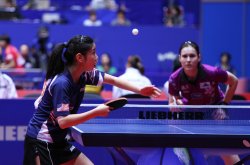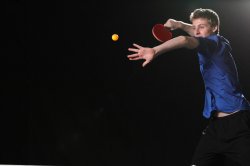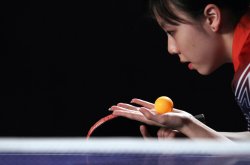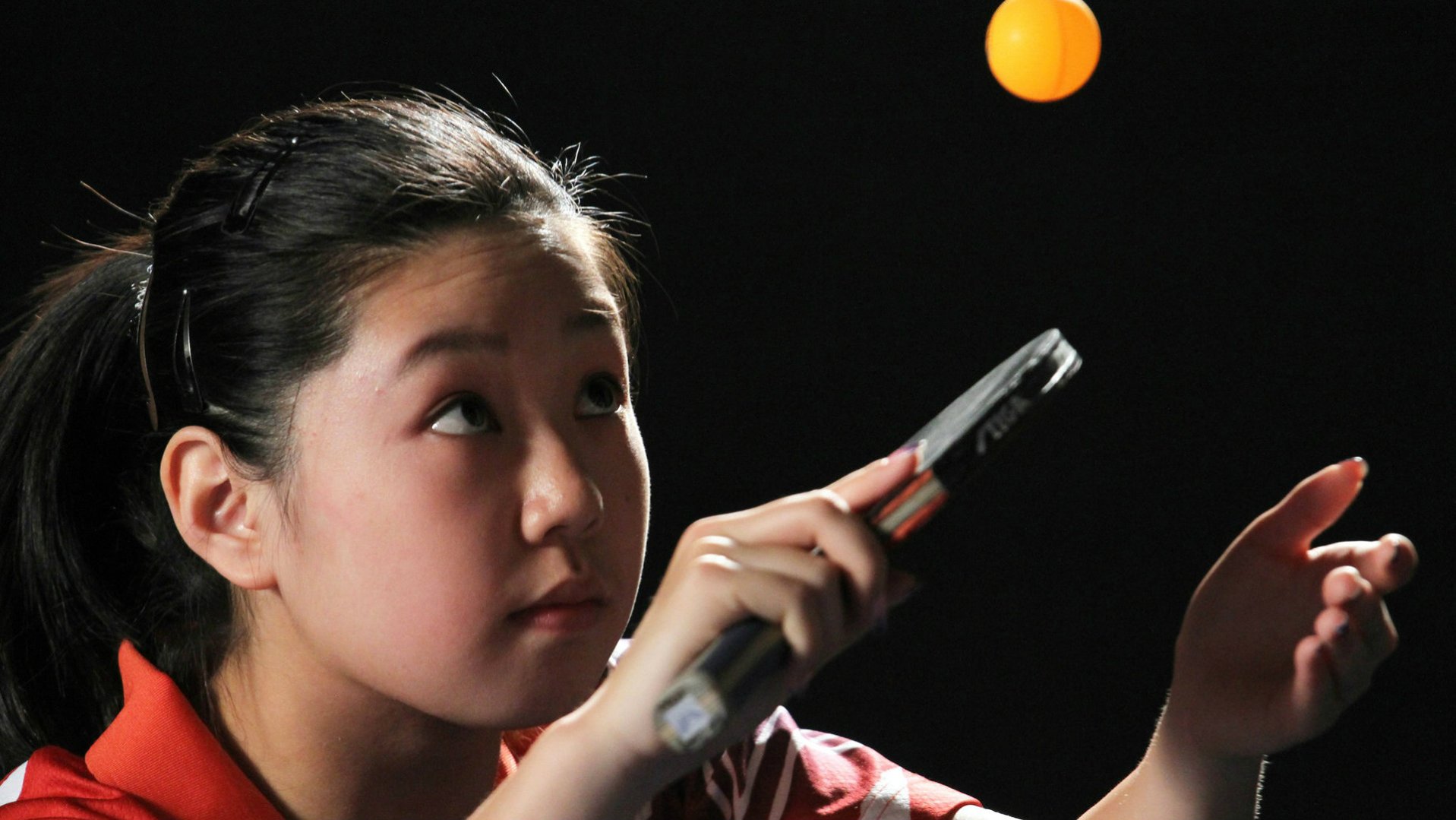 First Run Features
First Run FeaturesWhen I first saw the trailer for Top Spin, a new documentary about three American teenagers immersed in the hyper-competitive world of table tennis, I was expecting a film about young athletes driven to extremes by helicopter parents and cutthroat coaches. As a former sportswriter, I’ve seen too many kids’ lives practically ruined by the demanding, obsessive adults around them—especially in professional tennis.
And when I screened the movie recently, I thought my concerns would certainly be realized when these words appeared onscreen, right after the opening credits: “Athletes start training for the Olympics as young as 10 years old, sacrificing their childhood in pursuit of a dream” (italics mine).
Uh-oh, I thought. This could get ugly. And given that two of the three protagonists were Chinese-American kids only added to the worry, what with stereotypes about super-strict Asian parents . . . especially in the wake of Amy Chua’s Battle Hymn of the Tiger Mother and self-deprecating memes like these.
Thankfully, those concerns were put to rest as we get to know Michael Landers, 17, Ariel Hsing, 16, and Lily Zhang, 15, the ping-pong whiz kids at the center of the story.
Those concerns drop further by the wayside even more as we meet their parents, all of whom seem perfectly sane, loving, and encouraging—not at all the rabid stereotype living vicariously through their children’s victories. You get the feeling that if ping-pong were suddenly banned, the kids would be all right . . . and so would their moms and dads.
Not to say that the film is devoid of tension, because there’s plenty of it. It’s just that most of it involves the competitions themselves, as our three protagonists work hard in hopes of making it to the 2012 Olympics in London. (Yes, it was filmed several years ago, but is only just now getting a release—partly because the filmmakers had to wait on funding from a Kickstarter campaign.)
But there’s little tension between these rising stars and their parents—far less than you’d see in most American homes, much less in families with elite young athletes. Either the filmmakers weren’t around when Michael, Ariel, and Lily argued with their parents, or they opted to cut those scenes. Or, there’s a third possibility: These kids are so good, and their relationships with their parents so strong, that they just rarely, if ever, get into squabbles. And given what is depicted in this 80-minute film, that just might be the case.
We do see some minor disagreements between parents, especially Ariel’s. Her father is also her coach, and works with his daughter 4-6 hours a day. He keeps saying that “we always talk about the process, not the results,” but when Ariel competes, he admits that it’s hard to follow his own principles; he desperately wants her to win. At one point, when he and Ariel’s mother are interviewed, Dad declares that after college, Ariel will play professionally. Her mom rolls her eyes and shushes him, saying, “I don’t see that happening. I just want her to get an education.” Dad frowns, but nods.
 First Run Features
First Run FeaturesAriel is cute, composed, ever optimistic. She’s the most outgoing of the three, and excels at articulating her thoughts. She says that even though Lily is a year younger, “she has a maturity I don’t have yet. She thinks more than the rest of the girls. I think it’s a good thing I’m not that mature yet, because that means you’re more fearless. You just go out there and you don’t think about the consequences.” Which I thought was pretty mature.
Perhaps Ariel’s assessment comes because Lily always seems serious, stoic. She’s often frowning, brow furrowed. She only smiles after a win . . . or when she’s hanging with friends, doing each other’s nails, giggling giddily. After tournaments, Lily won’t practice for up to two weeks, unheard-of for an elite athlete, especially with the Olympic trials on the horizon. But it’s also the most refreshing part of the film; Lily, so driven by her sport, wants “to catch up on everything,” as she says. You know, like boys, friends, music—just being a girl.
Michael, meanwhile, has more than just the Olympics on his mind. He’s the only high school senior of the three, and he’s not only trying to sharpen his game, he’s taking SATs and applying to college. And he’s juggling endorsement deals, and traveling around the world to train and compete. He’s very open about the stress and pressure he feels.
Less than three months before the Olympic trials, Michael goes to China to train with the Chinese team—always the best in the world. Incredibly fit by most standards, Michael finds the Chinese training sessions grueling, almost impossible. Though he’s the youngest ever U.S. men’s table tennis champion, Michael is just a mediocre talent in the midst of this ping-pong dynasty.
A Chinese coach describes Michael as “fairly good for an amateur,” but then he puts the hammer down, accentuating the cultural differences between the two countries: “Assuming Michael [who practices about 6 hours a day at home] trains much less frequently when he is in the U.S., further improvement is difficult to make. I think it’s wrong to come here and train intensely for two months, only to go back to rest. If you want to play ping-pong, great. Just never stop playing it.”
 First Run Features
First Run FeaturesOnly to go back to rest. The message is loud and clear: You Americans are lazy and don’t know the meaning of hard work. You have to sacrifice everything to be the best in the world.
We American are crazy about sports. And we do sometimes lose perspective, and many kids—far too many—are giving up their childhoods to pursue their dreams . . . or, as is often the case, the dreams of their parents, who often sacrifice their offspring at the altar of sport.
So it’s refreshing to see these three likeable teens, who certainly work very hard at their games, keep things in perspective. Yes, they make some sacrifices (Michael, for example, misses his senior prom), but I’m glad they aren’t sacrificing everything. They have friends and real lives beyond table tennis. The Chinese might win the gold almost every single time (they’ve won 20 of 24 gold medals since table tennis became an Olympic sport in 1988, and the U.S. has never medaled). But these kids have hearts of gold.
As the Olympic trials draw near, it’s fun to watch them really go for it, and you’ll be rooting for them to make the team. And no matter what happens next, their childhoods remain sane and very intact. That’s the best spin you can put on this fine documentary.
Caveat Spectator
Top Spin does not have an MPAA rating, but it’s pretty much G-rated material throughout. There’s nothing remotely offensive. The film makes for good discussion fodder for parents and teens about finding the right balance between working hard to chase a dream, and maintaining a healthy, normal childhood.
Top Spin opens August 21 in Los Angeles only, but will screen in more cities in the coming months.
Mark Moring, a writer in Atlanta, was never very good at ping-pong, but he did have a pretty good tennis game and a 120-mph serve. Alas, no more.












